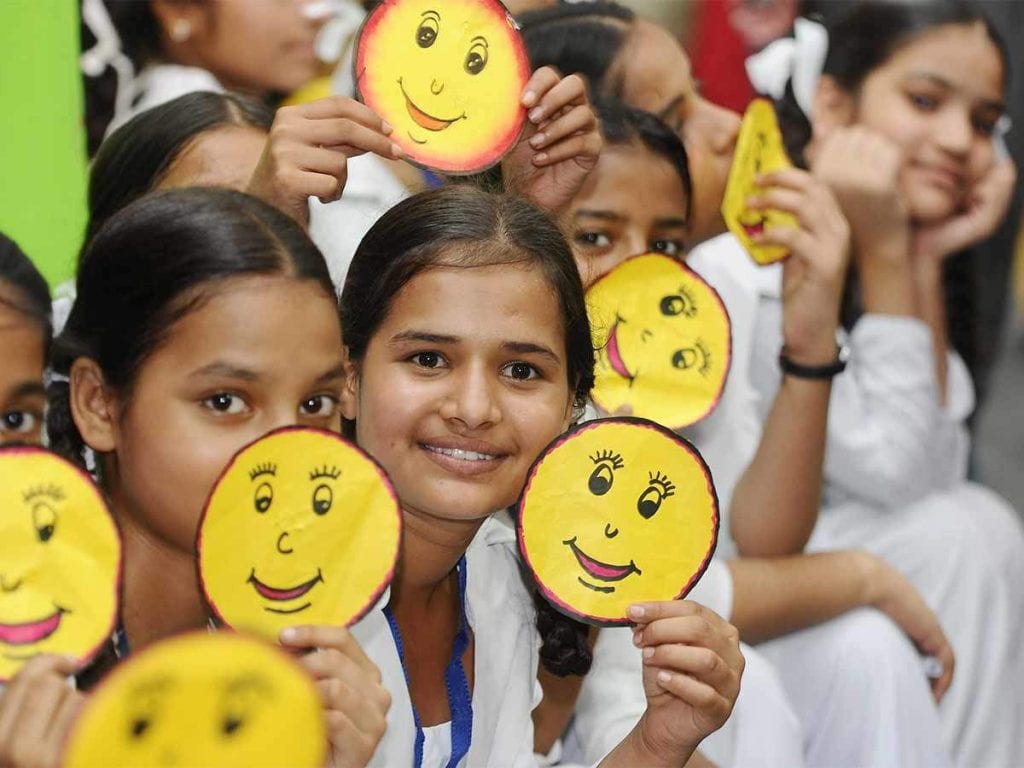“Don’t worry, be happy” a classic song by Bobby McFerrin with a simple message but it’s easier said than done in today’s high-stress world. Read on to learn why happiness is finally becoming a school subject matter in parts of India and beyond!
With recent reports about India’s key schools offering up happiness-based certificate programs and including the philosophy of happiness in their cirriculum we got to thinking … what took so long? It makes perfect sense and something that we should look to for inspiration.
World-wide reports continue to show high-stress rates (in India, 89% of the population reported high-stress rates in 2018) and the numbers are scary. What helps ease our fears is that alongside that, the understanding of the importance of mental health continues to grow.
Initiatives to break the stigma around mental illness continue to gain traction as more countries, people and organizations get involved (examples include the annual Bell Let’s Talk Day and work done by the Mental Health Foundation of India).
It’s important to discuss and act regarding mental illness but as we learned from the work of Positive Psychologist Shawn Achor is that the absence of mental illness, does not mean mental well-being. So, what does mental well-being mean? Everyone will have a unique perspective on what mental health means to their life but the ability to feel happiness is considered a factor most would agree on.
Happiness as a large part of the human experience; it impacts our mental, emotional, spiritual and physical well-being. That being said, it’s starting to appear in more school curriculum as a subject matter or field of study and since it plays a significant role in social-emotional intelligence and can a strong understanding of it can help reduce high-stress levels, we’re thrilled it’s getting more of the academic attention it deserves in particular in India which ranked 133rd out of 156 countries in the World Happiness Index in 2018.

What Exactly Is Happiness?
An age-less question that can generate a different answer from every individual. Many would agree it’s not necessarily a concept that needs a formal definition as it involves the human experience of feeling. Overall, it can be described as a feeling of contentment, satisfaction and/or joy and some will say it’s the whole point of life. Happiness is limitless (we will never run out of our ability to feel or cultivate it) and it involves several feelings including that your life has meaning, that your needs are fulfilled are two of the many.
As science has turned an introspective eye to happiness, more distinctions are being made (e.g. happiness differs from pleasure) and one revelation of key importance is that happiness does not involve an absence of negative emotions. Sadness and anger like happiness are part of the human experience; we will not feel true happiness by trying to override, ignore or push away negative feelings.
From this mindful perspective, happiness is not something to pursue, but something inside of us spiritually, emotionally, physically and psychologically to connect too. It’s not based on external, materialistic factors but based on internal perspective. Happiness is something that’s so simple it becomes complicated and that’s one of the key reasons it should be studied in schools which play a huge role in human development.

Why Should We Study Happiness?
With stress-rates, anxiety and depression rates on the rise, countries all over the world are beginning to understand why happiness needs to be studied. Schools are starting to make curriculum changes that incorporate more social-emotional learning (happiness falls within that realm) across all age-groups in hopes to help people develop the tools to support with stress management.
Some schools are taking it even further by offering formal degrees around happiness for example Gujarat University launched a “Happiness Counselling” degree in August 2019, a three-month long course (with classes that fall over the weekend) in which students will learn stress management by focusing on ways to cultivate happiness through theory, food, dance and more.
Delhi is also making changes to curriculum by introducing happiness curriculum in government schools for students in nursery school to year eight (the curriculum is largely based on experiential learning, mindfulness and activities and not formal tests). For older students, Ramanujan College in Delhi is also offering a six-month course on happiness under it’s Centre of Ethics and Virtues.
Positive Psychology is also a growing field with an increase in degrees being offered at a graduate level.
Want To Learn More About Happiness?
A formal college or university degrees on happiness may not be feasible for everyone but if you want to learn more about happiness we recommend The Science of Happiness course by the Greater Good Science Center, a part of the University of Berkeley California. The online course is free of charge, so you have nothing to lose and only a stronger understanding of happiness to gain!
Main Image Photo Credit: www.independent.ie
Rachna Sethi
Author
Rachna (@thesassyspiritual) is a graduate of the Applied Mindfulness Meditation program from the University of Toronto, a certified Educator with two bachelor degrees and a diploma in Art Therapy. She's dedicated to living with a compassionate approach. Committed to helping people integrate Mindfuln...














































































































